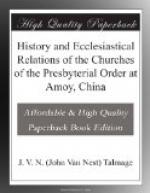3. The only other supposed advantage I can now think of, is the advantage of carrying out the policy of our Church. This, in itself considered, might be regarded worthy of but little attention. Cannot—ought not—the Church change her policy if wrong, or if a better can be adopted? Surely her laws are not like those of the Medes and Persians. But the argument has been used with so much earnestness and perseverance, both in the Reports of the Committees and in the discussions in Synod, that it demands some investigation. Instead of the course pursued by the Missionaries being, as it is contended, contrary to, it is the true policy of our Church—the policy in existence long before the decision of 1857. If the course now required of them be the present policy of our Church, it is a mistaken policy, contrary to the very genius of our institutions, and ought to be corrected. It is so contrary to our time-honored Constitution that either it or the Constitution must be sacrificed. In order to save the policy it was found necessary during the past year to amend the Constitution by a clause so sweeping, that if the circumstances of a Missionary Classis require it, “all the ordinary requirements of the Constitution” may be dispensed with by the General Synod. Can it be that a policy which requires such constitutional changes can be the old and proper policy of our Church? But if the policy be continued we are not yet done with changes. The very name of our Church must be changed. It now is “The Reformed Protestant Dutch Church in North America.” We must expunge the words “in North America,” or must add India, China, and Japan, and every other country where the Church may undertake Missionary work. We know it has been said of this policy, “it is our settled, irreversible policy.” Is every thing then to be regarded as unsettled and changeable but this policy of the Church? We answer, No. The Church may change her name, if she please, as she has changed her Constitution. Or she may change her policy. But there are certain fundamental principles of Church government which she may not change. Hence, even yet, the principles for which the Missionaries contend must remain the true policy of our Church, for they lie at the very




